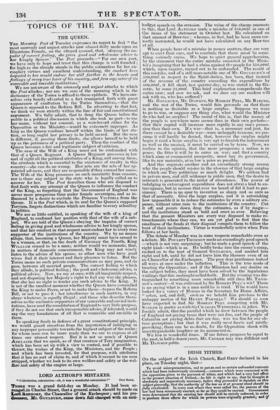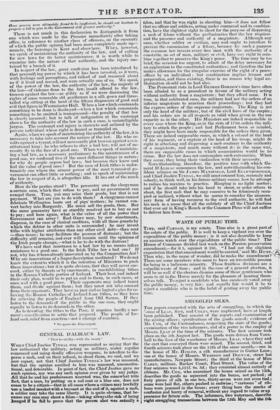IRISH TITHES.
Ow the subject of the Irish Church, Earl GREY declared in his place, on Tuesday night, that— To avoid misrepresentation, and to put an end to certain unfounded rumours which had been industriously circulated,—rumours which were connected with the opposition given to the payment of tithes, and which had a very bad effect in the present situation of Ireland,—he Mt it right to say, that he thought it absolutely and imperatively necessary, before they proceeded to legislate on this sidject generally, that the authority of the law as it at present stood should be fully vindicated. In every cast where they were called for, the powers of the Jaw had been strenuously exerted, so far as they could be exerted. Government were determined that the exisfing law should still be strictly enforced, in order to produce those effects for which its powers were originally granted; and if
those powers were ultimate! found to be inefficient, he should not hesitate to propose a bill to give to the Government still greater authority.*
There is not much • in this declaration to distinguish it from one which was made by the Premier immediately after taking office, in reference to another class of offences, on the enormity of which the public opinion had been more completely made up— namely, the burnings in Kent and elsewhere. When, however, We speak of maintaining the authority of the law, and of calling for new laws for its better maintenance, it is worth while to examine into the nature of that authority, and the injury sus- tained by a breach of it. In respect of the law, great confesimi has been introduced by that personifying power by which it has been invested, as it were, with feelings and perceptions, and talked of and reasoned about as if it lived and moved, and were actually one of us. We speak of the power of the law, the authority of the law, the majesty of the law—of violence done to the law, insult offered to the law, treason against the law—as- glibly as if we were discussing the rights of some venerable old gentleman in a silk gown and three- tailed wig sitting at the head of the fifteen dispensers of good and evil that figure in Westminster Hall. W hen a law which commands something to be done is disobeyed—when a law which commands something to be omitted is transgressed—the penalty of that law is clearly incurred; but to talk of indignation at the contempt shown for the authority of the law in such a case, is unintelligible jargon. The contempt and injury is shown to and suffered by the private individual whose right is denied or trampled on. Again, when we speak of maintaining the authority of the law, it is necessary to take into account the nature of the law. He who re- volts against a tyrant, will not necessarily plot treason against a ccn- stitutional king; he who refuses to obey a bad law, will not of ne- cessity fly in the face of a good one. When we speak of maintain- ing a.bad law, as a necessary preliminary to the maintenance of a good one, we confound two of the most different things in nature; for why do people oppose bad laws, but because they know and feel the value of good ones ? But the case of Irish tithes is unfor- tunately one where the utmost power of the most tyrannical go- vernment can effect little or nothing; and to speak of maintaining the law in respect of it, is altogether idle. It lies out of the reach of authority. How do the parties stand ? The peasantry owe the clergyman a certain sum, which they refuse to pay, and no government can compel them. True, you may seize their goods, but that is not payment. What are you to do with them? A clergyman cannot fabricate Wellington boots out of pigs' trotters; he cannot con- vert barley into Burgundy. He must sell the goods, then. But the same peasantry have as sturdily resolved not to buy as not to pay; and here again, what is the value of all the power that Government can array ? Earl GREY may, by new enactments, dispense, in the case of clerical creditors, with all those guards by which the debtor in other suits is surrounded ; he may invest tithe with higher attributes than any other civil debt—than rent —than taxes; he may facilitate the process of distraint; but the difficulty still remains, and ever will remain until the opinions of the Irish people change,—what is he to do with the distress? We have said that resistance to a bad law by no means infers resistance to a good one. Is the Irish Tithe law a bad one? If not, why has it been already innovated on by the Composition Act? Why are innovations of a larger description meditated ? We do not know the extent to which it is the intention of Ministers to push these innovations ; but it is quite obvious, that they will never suc- ceed, either by threats or by enactments, in reestablishing tithes in the Roman Catholic portion of Ireland. Their best, and indeed their only plan, would be to put an end to them, in such cases, at once and with a good grace. Their opponents may indeed taunt them, and divide against them ; but they must not take counsel from their opponents. They have as just and as logical a plea for re- lieving the Roman Catholics of Ireland from tithes, as they have for relieving the people of England from Old Sarum. If they listen to the demands of the public in the one case, they ought equally to listen to its demands in the other. As to devoting the tithes to the Poor, it requires hardly a mo- ment's consideration to settle that proposal. The people of Ire- land seek relief from exaction—not a change of exactors.
* We quote the Times report.



























 Previous page
Previous page